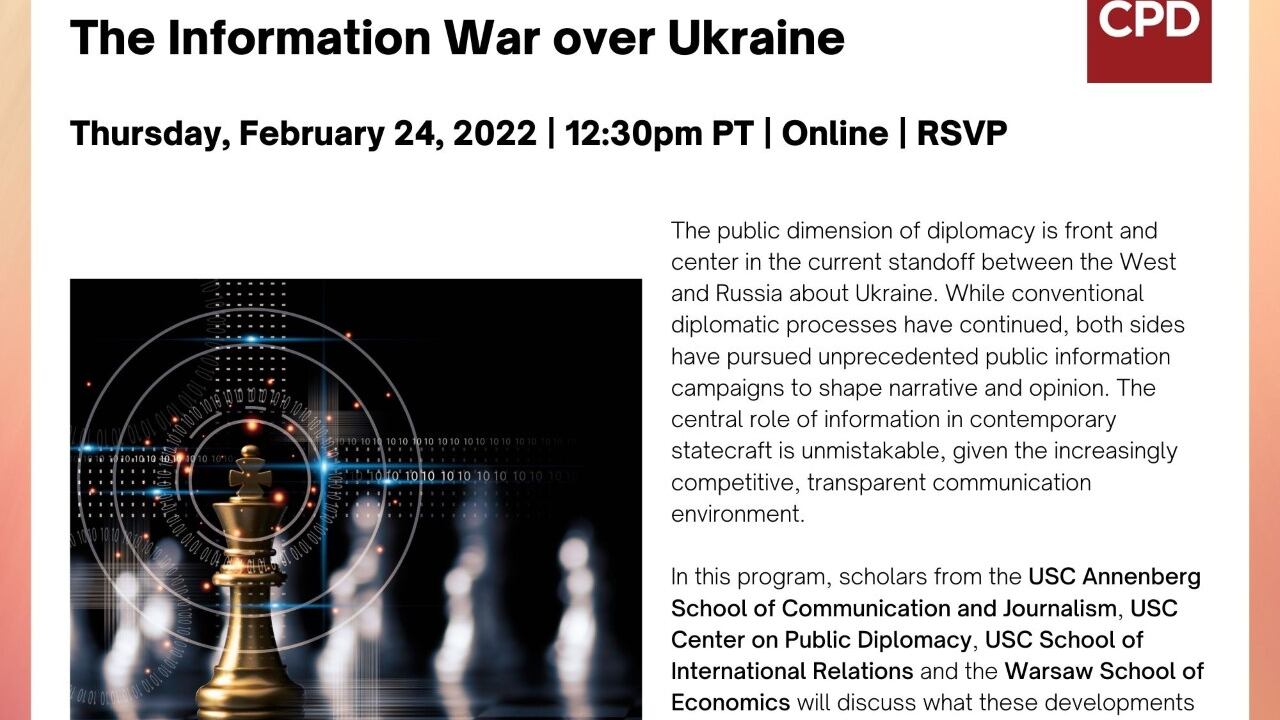Experts from across USC joined the Center for Public Diplomacy Thursday for a panel discussing the mounting communication issues surrounding the Russian invasion of Ukraine and ongoing attacks that have killed at least 137 soldiers and civilians so far.
The panel, titled “The Information War on Ukraine,” included faculty members from various departments across campus including the Center for Public Diplomacy, Annenberg, international relations and Slavic studies.
“We woke up to a new war in Europe,” said Jay Wong, director of the CPD and moderator of the virtual event. “Given the increasingly competitive and transparent communication environment, the central role of information in contemporary statecraft is unmistakable.”
Nicholas Cull, a CPD faculty fellow and professor of public diplomacy, presented the concept of “news media disruptions.” He said that while social media has been used to spread news, governments like the Kremlin use it to create false narratives and confusion.
According to Cull, the coverage of geopolitical conflicts often becomes more confusing as they develop in the news cycle and misinformation spreads. He argued this has been a developing issue for Ukraine since the country has faced previous attacks and a loss of territory from Russia.
Cull said it was worrying that one year into President Joe Biden’s tenure, his administration has yet to assign someone to a leadership role in public diplomacy.
“I understand that they are waiting to find the perfect person,” Cull said. “But in the meantime, it’s ridiculous that we don’t have the kind of leadership necessary to put together a powerful presence within the Beltway.”
Adam Yehia Elrashidi, a faculty fellow at the USC Annenberg Media Center, argued that the media coverage of these attacks should be done through an objective journalistic lens and using basic journalistic principles.
“I think the best way to combat misinformation [and] disinformation is – as cliche as it sounds – is actually doing the job that we’re supposed to be doing, which is to do our research, hold people accountable and not be afraid of the consequences,” Elrashidi said.
The panelists also shifted their discussion towards sanctions on Russia and the effect they might have on Russia, Ukraine and each country’s citizens.
Katarzyna Pisarska, founder and director of the European Academy of Diplomacy in Poland, spoke about the difficult role that sanctions toward Russia would play in response to these events.
“We have to realize that Vladimir Putin has gone into this war prepared for the worst sanctions. So if you think that any type of sanctions are going to stop him tomorrow? Well, that’s extremely naïve,” Pisarska said. “Any sanctions we put today will hurt [Russia] over the long term, and that is really [the U.S. and NATO countries’] goal.”
However, Putin and the Kremlin do have the wealth built up to withstand these sanctions for potentially as long as two years, Pisarska argued. Instead, the main goal of sanctions against Russia should be to show support to Ukraine, she said.
“Our role today is to increase maximally the sanctions to show not only solidarity with Ukraine, but most importantly, unity of the Western alliance,” Pisarska said.
In response, Elrashidi argued that these sanctions would result in a greater effect on the citizens rather than those responsible for these attacks.
“[Government officials] have money, they have wealth, they have resources,” Elrashidi said. “It is the everyday people who can’t afford medicine, who can’t afford food.”
According to Pisarska, Ukrainian citizens do want countries like the U.S. to impose sanctions on Russia.
“I understand you speak about this Russian society which might be affected by the sanctions,” she said. “Then please, today, let’s think about 45 million Ukrainians who are being bombed, who don’t have access to water, to electricity, to food.”
This brought forth the point that sanctions are necessary to stop Putin’s attacks, but it is a matter of how prepared the rest of the NATO countries are to lose resources like Russian gas and oil in response to these sanctions, Dornsife professor and expert in Russian politics Robert English argued.
“Can we impose will the will of the United States and other NATO countries be unified enough and ready, as she said, to endure the pain because they’re going to hurt us, too? Or are we too soft?” English posited.
Toward the end of the discussion, panelists returned to the conversation surrounding misinformation and news. Elrashidi argued once more that the responsibility lies with journalists to report fairly and accurately so that audiences receive correct information surrounding the invasion.
“Media systems are only as good as the journalists doing the work,” Elrashidi said. “If journalists are fundamentally more interested in and just in the prestige of being a journalist and the romantic version of being the journalist as opposed to telling the truth, being accountable, being independent and minimizing harm the best they do, … then you’re going to keep seeing the same misinformation.”
